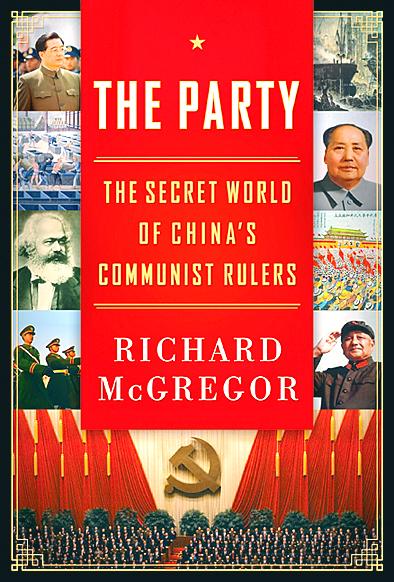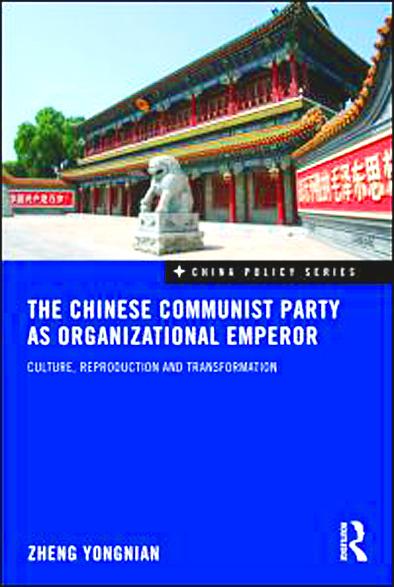The claim that the Chinese Communist Party (CCP) is misunderstood by outsiders has become something of a cliche recently, conferring upon the almost 80-year-old political organization an aura of impenetrability. This dearth of knowledge has slowly been remedied, however, with the publication in recent years of solid studies on the party’s philosophy, modus operandi and ability to defy the odds by remaining in power.
Two new books, The Party, by former Financial Times Beijing bureau chief Richard McGregor, and The Chinese Communist Party as Organizational Emperor, by National University of Singapore professor Zheng Yongnian (鄭永年), make important new contributions to our understanding of this most enigmatic of political parties.
Though targeting very different audiences (McGregor’s style is journalistic, whereas Zheng’s is overly academic), the two works reach similar conclusions as to the CCP’s strategies, conclusions that had already been proposed in David Shambaugh’s China’s Communist Party: Atrophy and Adaptation (reviewed in the Taipei Times on May 11, 2008). The party brooks no organized opposition (what Zheng refers to as a counter-hegemony), does not tolerate the formation of political parties capable of challenging its hold on power, opposes the complete divorcing of party from state, and does not encourage the evolution of democracy as it is understood elsewhere.

This said, the CCP is no monolith, as the two books clearly demonstrate, nor has it failed to comprehend the tremendous challenges that have emerged as the country modernizes and embraces capitalism. The party’s decision to allow capitalists to become CCP members, which Zheng describes as an epochal development in the politics of the past century, is a case in point.
This adaptability, McGregor and Zheng argue, has also had effects on the state’s willingness to use force to repress dissent. Though, in the extreme, the security apparatus will not hesitate to violently quell dissent, the preferred means of oppression have become more refined and subtle, relying instead on intimidation and, with increasing success, co-optation.
Intra-party democracy, or the “accommodation of democratic elements,” which Zheng looks at in more detail than McGregor, is also a product of the CCP’s adaptability and, along with economic growth, probably the key to its survival.

Both authors point to corruption, particularly among the upper ranks of the CCP, as well as unequal distribution of wealth, as posing the greatest risks to state stability and by extension to the party. McGregor and Zheng cite the demise of the Shanghai clique in the mid-1990s and the use of allegations of corruption to bring top officials to heel as examples of how the war on corruption has become intrinsic to factional politics. McGregor’s description of the party apparatus in charge of investigating corruption (and the system that enables officials at the very top to avoid scrutiny) makes for particularly entertaining reading.
While there isn’t anything fundamentally new about the subjects addressed by the two authors, their exploration of the various CCP departments, and how they intersect and interact with the state apparatus, is very helpful, though Zheng’s, which can become so detailed as to name the professors teaching specific classes in the Central Party School, will likely appeal to a very confined group of experts on China.
An interesting point where the two works depart, and what makes them complementary, in a way, is in Zheng’s attempt to portray the CCP not so much as an oddity, but as the product of the society in which it emerged — hence the “reproduction” in the title. Throughout his book, Zheng makes the case that the CCP’s approach to power is contingent on historical continuity and draws from practices implemented back when the country was ruled by emperors. Though this argument could be exploited to make a case against democratization, it nevertheless makes a valid contribution to our understanding of the party’s resistance to Western-style democracy and the ostensible lack of widespread calls for such democracy among ordinary Chinese. Interestingly, we learn that Sun Yat-sen (孫逸仙), the father of the Republic of China, was also opposed to the creation of public associations outside his party and proposed the idea of “partifying the masses” as an alternative to independent social organizations.
Ironically, as Zheng points out, historical continuity, i.e., the reproduction of the organizational emperorship, is also the main driver behind the CCP’s need to adapt and embrace Marxism’s nemeses, such as capitalism and democratic elements, as Chinese history is rife with examples of rigid systems being overthrown by a counter-hegemonic force. As such, to avoid a similar fate, the CCP has no choice but to open up, which in turn empowers other social classes that must be kept in check lest they overturn the system. “As long as the CCP is able to reproduce itself as an organizational emperor,” Zheng concludes, “it is unlikely that China will develop into a Western style of democracy.”
These two works come highly recommended. McGregor’s is easily devoured in a few sessions, while Zheng’s prose, heavy in political jargon and at times repetitive, undermines the book’s readability, and as a result its contribution to our understanding of the CCP is unlikely to reach a mass audience.
For all his nuanced perspective on the Chinese political system, Zheng also makes an incomprehensible slip toward the end, claiming, after indirectly laudatory passages about the emergence of democracy in Taiwan, that democratization characterized by the emergence of a multiparty system in Taiwan has not enabled the country to improve living standards as effectively as China, and led to corruption, “social decay” and “economic chaos.” Coming as it does in the conclusion of his book, this hyperbolic remark hints at a bias against democracy that raises all kinds of unanswered questions about the book’s premise.

On April 26, The Lancet published a letter from two doctors at Taichung-based China Medical University Hospital (CMUH) warning that “Taiwan’s Health Care System is on the Brink of Collapse.” The authors said that “Years of policy inaction and mismanagement of resources have led to the National Health Insurance system operating under unsustainable conditions.” The pushback was immediate. Errors in the paper were quickly identified and publicized, to discredit the authors (the hospital apologized). CNA reported that CMUH said the letter described Taiwan in 2021 as having 62 nurses per 10,000 people, when the correct number was 78 nurses per 10,000

As we live longer, our risk of cognitive impairment is increasing. How can we delay the onset of symptoms? Do we have to give up every indulgence or can small changes make a difference? We asked neurologists for tips on how to keep our brains healthy for life. TAKE CARE OF YOUR HEALTH “All of the sensible things that apply to bodily health apply to brain health,” says Suzanne O’Sullivan, a consultant in neurology at the National Hospital for Neurology and Neurosurgery in London, and the author of The Age of Diagnosis. “When you’re 20, you can get away with absolute

May 5 to May 11 What started out as friction between Taiwanese students at Taichung First High School and a Japanese head cook escalated dramatically over the first two weeks of May 1927. It began on April 30 when the cook’s wife knew that lotus starch used in that night’s dinner had rat feces in it, but failed to inform staff until the meal was already prepared. The students believed that her silence was intentional, and filed a complaint. The school’s Japanese administrators sided with the cook’s family, dismissing the students as troublemakers and clamping down on their freedoms — with

As Donald Trump’s executive order in March led to the shuttering of Voice of America (VOA) — the global broadcaster whose roots date back to the fight against Nazi propaganda — he quickly attracted support from figures not used to aligning themselves with any US administration. Trump had ordered the US Agency for Global Media, the federal agency that funds VOA and other groups promoting independent journalism overseas, to be “eliminated to the maximum extent consistent with applicable law.” The decision suddenly halted programming in 49 languages to more than 425 million people. In Moscow, Margarita Simonyan, the hardline editor-in-chief of the